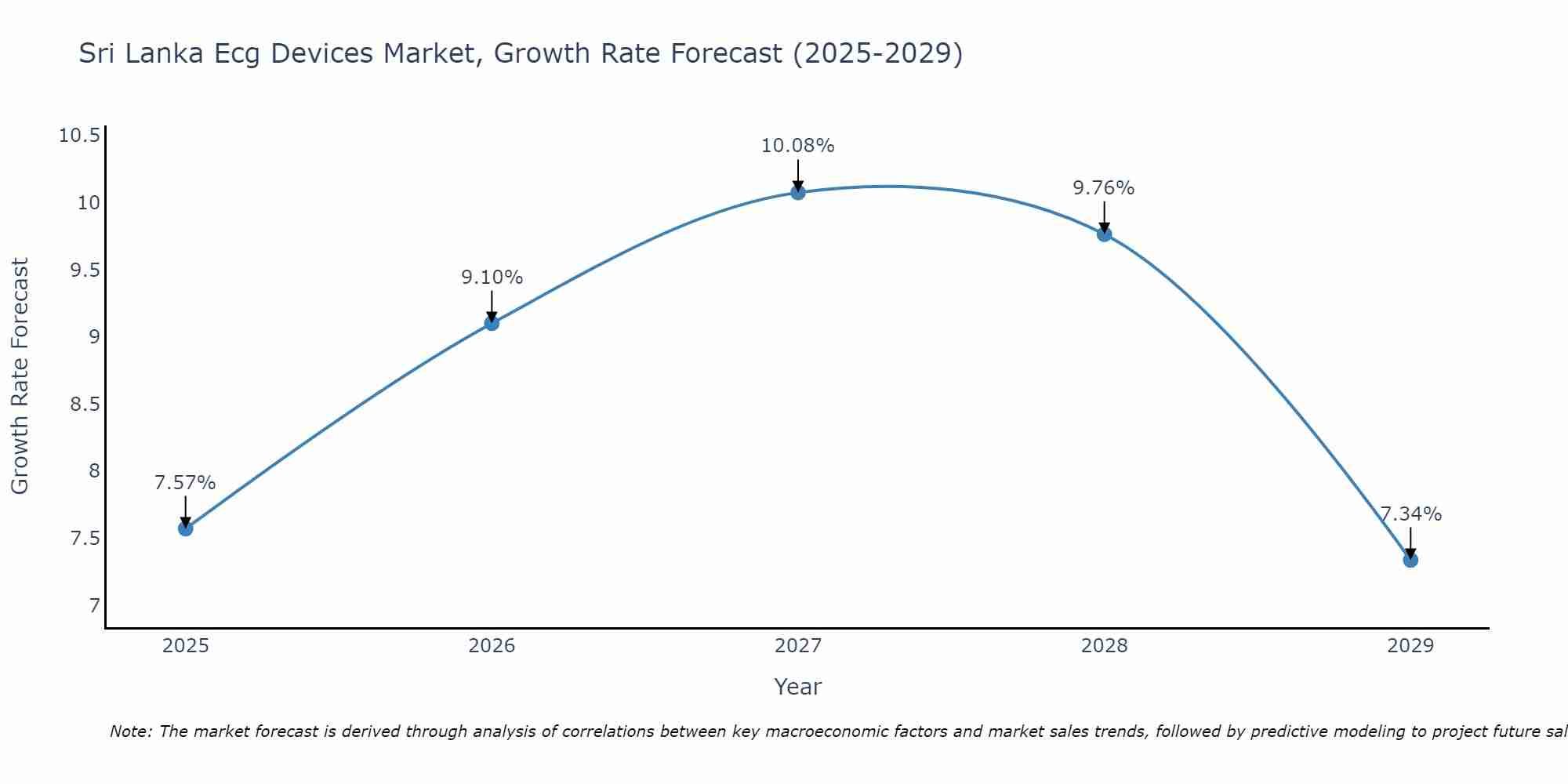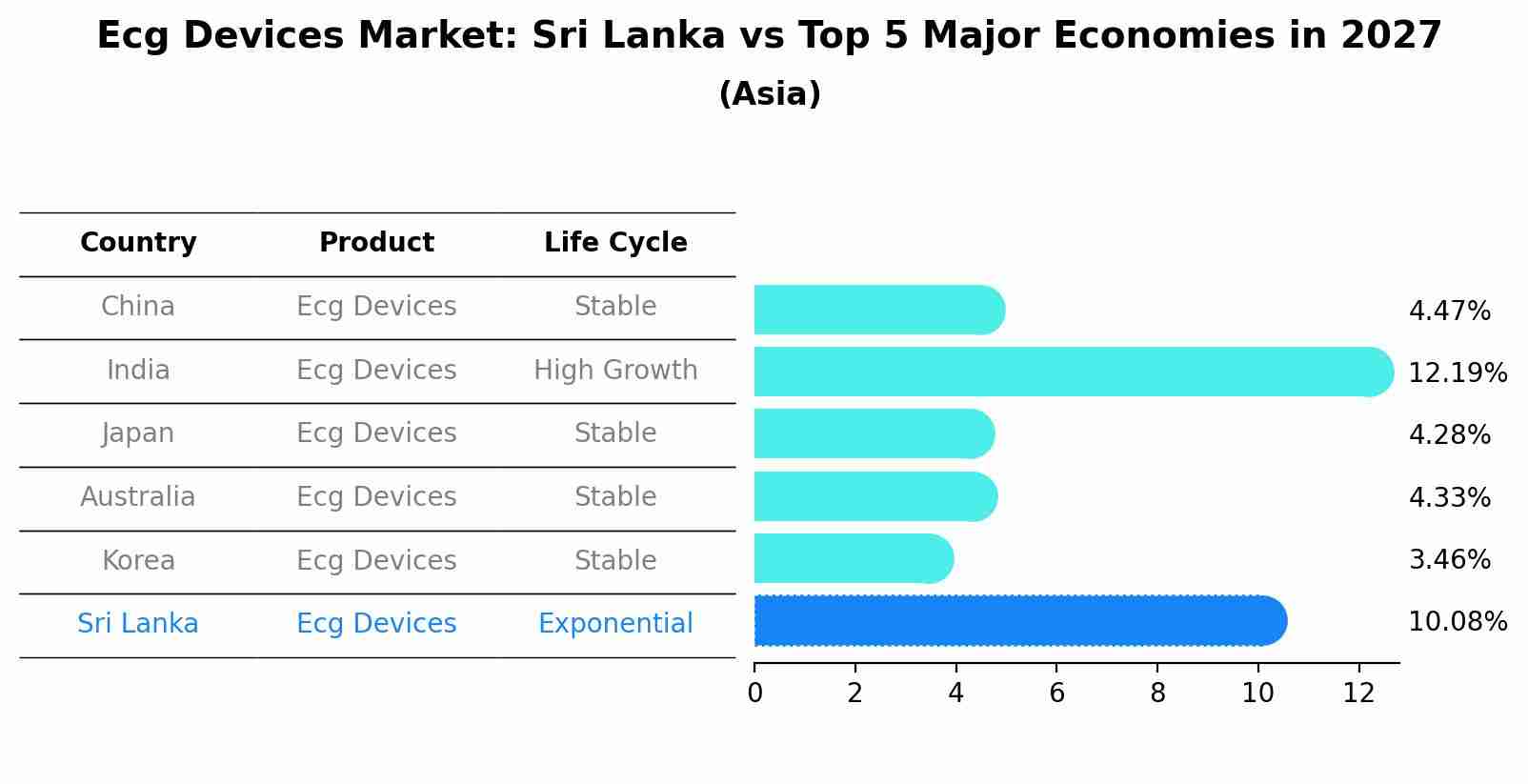Sri Lanka Ecg Devices Market Outlook | COVID-19 IMPACT, Analysis, Trends, Revenue, Companies, Value, Growth, Forecast, Industry, Size & Share
| Product Code: ETC363391 | Publication Date: Aug 2022 | Updated Date: Aug 2025 | Product Type: Market Research Report | |
| Publisher: 6Wresearch | Author: Sachin Kumar Rai | No. of Pages: 75 | No. of Figures: 35 | No. of Tables: 20 |
Sri Lanka Ecg Devices Market Size Growth Rate
The Sri Lanka Ecg Devices Market is projected to witness mixed growth rate patterns during 2025 to 2029. The growth rate begins at 7.57% in 2025, climbs to a high of 10.08% in 2027, and moderates to 7.34% by 2029.

Ecg Devices Market: Sri Lanka vs Top 5 Major Economies in 2027 (Asia)
By 2027, Sri Lanka's Ecg Devices market is forecasted to achieve a high growth rate of 10.08%, with China leading the Asia region, followed by India, Japan, Australia and South Korea.

Sri Lanka Ecg Devices Market Synopsis
The Sri Lanka ECG devices market is experiencing steady growth driven by factors such as the increasing prevalence of cardiovascular diseases, growing awareness about preventive healthcare, and advancements in technology. Hospitals, clinics, and diagnostic centers are the primary end-users of ECG devices in the country. Portable and wireless ECG devices are gaining popularity due to their convenience and ease of use. The market is characterized by the presence of both multinational companies and local players offering a wide range of products to cater to the diverse needs of healthcare providers. Government initiatives to improve healthcare infrastructure and services are also contributing to the growth of the ECG devices market in Sri Lanka. Overall, the market is expected to continue expanding as the demand for accurate and efficient diagnostic tools for cardiovascular conditions increases.
Sri Lanka Ecg Devices Market Trends
The Sri Lanka ECG devices market is experiencing a trend towards portable and wireless ECG monitoring devices. These devices offer convenience and flexibility for patients to monitor their heart health remotely, leading to an increased demand for home-based monitoring solutions. Additionally, there is a growing focus on digital health technologies and telemedicine applications in Sri Lanka, which is driving the adoption of ECG devices that can seamlessly integrate with telehealth platforms. Furthermore, advancements in AI and machine learning technologies are enabling ECG devices to provide more accurate and timely insights, enhancing the diagnosis and management of heart conditions. Overall, the market is witnessing a shift towards more patient-centric and technologically advanced ECG devices to improve healthcare accessibility and outcomes in Sri Lanka.
Sri Lanka Ecg Devices Market Challenges
In the Sri Lanka ECG devices market, some challenges faced include limited access to advanced technology in rural areas, inadequate healthcare infrastructure and resources, affordability issues for patients, and a shortage of skilled healthcare professionals trained in interpreting ECG results. Additionally, there may be regulatory hurdles and lack of standardized protocols for ECG testing and reporting. Competition from alternative diagnostic technologies and the need for continuous innovation to meet evolving healthcare demands also pose challenges for companies operating in this market. Overall, addressing these challenges will require collaboration between government agencies, healthcare providers, medical device manufacturers, and other stakeholders to improve accessibility, affordability, and quality of ECG services in Sri Lanka.
Sri Lanka Ecg Devices Market Investment Opportunities
The Sri Lanka ECG devices market offers promising investment opportunities due to the increasing prevalence of cardiovascular diseases in the country. With a growing elderly population and rising awareness about preventive healthcare, there is a growing demand for advanced ECG devices for early detection and monitoring of heart conditions. Investors can explore opportunities in the sale and distribution of portable ECG devices, wireless monitoring systems, and telemedicine solutions to reach underserved rural areas. Additionally, partnerships with healthcare providers and government initiatives to improve healthcare infrastructure can provide avenues for growth in the Sri Lanka ECG devices market. Overall, investing in innovative and cost-effective ECG technologies tailored to the specific needs of the Sri Lankan market can lead to long-term success and impact in the healthcare sector.
Jordan Agar Market Government Policies
The Sri Lanka government has implemented various policies related to medical devices, including ECG devices, to ensure quality and safety. The Medical Devices Act No. 23 of 2015 is the primary legislation governing the registration, importation, distribution, and sale of medical devices in the country, including ECG devices. The Act requires all medical devices to be registered with the National Medicines Regulatory Authority (NMRA) before being imported or distributed in Sri Lanka. Additionally, the NMRA has set specific guidelines and standards for the quality, performance, and labeling of medical devices, including ECG machines, to safeguard public health. The government also encourages local manufacturing of medical devices through incentives and support programs to reduce dependency on imports and promote domestic production.
Sri Lanka Ecg Devices Market Future Outlook
The Sri Lanka ECG devices market is expected to experience steady growth in the coming years, driven by factors such as increasing prevalence of cardiovascular diseases, growing awareness about preventive healthcare measures, and advancements in technology leading to the development of more compact and user-friendly ECG devices. The market is also likely to benefit from government initiatives aimed at improving healthcare infrastructure and services in the country. Additionally, the rise in geriatric population and changing lifestyle patterns contributing to heart-related disorders will further fuel the demand for ECG devices. However, challenges such as limited access to healthcare facilities in rural areas and budget constraints among the population may hinder market growth to some extent. Overall, the Sri Lanka ECG devices market is poised for expansion with opportunities for innovation and market penetration.
Key Highlights of the Report:
- Sri Lanka Ecg Devices Market Outlook
- Market Size of Sri Lanka Ecg Devices Market, 2021
- Forecast of Sri Lanka Ecg Devices Market, 2031
- Historical Data and Forecast of Sri Lanka Ecg Devices Revenues & Volume for the Period 2018 - 2031
- Sri Lanka Ecg Devices Market Trend Evolution
- Sri Lanka Ecg Devices Market Drivers and Challenges
- Sri Lanka Ecg Devices Price Trends
- Sri Lanka Ecg Devices Porter's Five Forces
- Sri Lanka Ecg Devices Industry Life Cycle
- Historical Data and Forecast of Sri Lanka Ecg Devices Market Revenues & Volume By Product Type for the Period 2018 - 2031
- Historical Data and Forecast of Sri Lanka Ecg Devices Market Revenues & Volume By ECG Resting System for the Period 2018 - 2031
- Historical Data and Forecast of Sri Lanka Ecg Devices Market Revenues & Volume By ECG Holter Monitoring System for the Period 2018 - 2031
- Historical Data and Forecast of Sri Lanka Ecg Devices Market Revenues & Volume By ECG Stress Testing System for the Period 2018 - 2031
- Historical Data and Forecast of Sri Lanka Ecg Devices Market Revenues & Volume By Cardiopulmonary Stress Testing System for the Period 2018 - 2031
- Historical Data and Forecast of Sri Lanka Ecg Devices Market Revenues & Volume By End User for the Period 2018 - 2031
- Historical Data and Forecast of Sri Lanka Ecg Devices Market Revenues & Volume By Hospitals for the Period 2018 - 2031
- Historical Data and Forecast of Sri Lanka Ecg Devices Market Revenues & Volume By Diagnostic centre for the Period 2018 - 2031
- Historical Data and Forecast of Sri Lanka Ecg Devices Market Revenues & Volume By Clinics for the Period 2018 - 2031
- Historical Data and Forecast of Sri Lanka Ecg Devices Market Revenues & Volume By Ambulatory Surgical Centre for the Period 2018 - 2031
- Sri Lanka Ecg Devices Import Export Trade Statistics
- Market Opportunity Assessment By Product Type
- Market Opportunity Assessment By End User
- Sri Lanka Ecg Devices Top Companies Market Share
- Sri Lanka Ecg Devices Competitive Benchmarking By Technical and Operational Parameters
- Sri Lanka Ecg Devices Company Profiles
- Sri Lanka Ecg Devices Key Strategic Recommendations
Frequently Asked Questions About the Market Study (FAQs):
- Single User License$ 1,995
- Department License$ 2,400
- Site License$ 3,120
- Global License$ 3,795
Search
Thought Leadership and Analyst Meet
Our Clients
Related Reports
- Afghanistan Apparel Market (2026-2032) | Growth, Outlook, Industry, Segmentation, Forecast, Size, Companies, Trends, Value, Share, Analysis & Revenue
- Canada Oil and Gas Market (2026-2032) | Share, Segmentation, Value, Industry, Trends, Forecast, Analysis, Size & Revenue, Growth, Competitive Landscape, Outlook, Companies
- Germany Breakfast Food Market (2026-2032) | Industry, Share, Growth, Size, Companies, Value, Analysis, Revenue, Trends, Forecast & Outlook
- Australia Briquette Market (2025-2031) | Growth, Size, Revenue, Forecast, Analysis, Trends, Value, Share, Industry & Companies
- Vietnam System Integrator Market (2025-2031) | Size, Companies, Analysis, Industry, Value, Forecast, Growth, Trends, Revenue & Share
- ASEAN and Thailand Brain Health Supplements Market (2025-2031) | Strategy, Consumer Insights, Analysis, Investment Trends, Opportunities, Growth, Size, Share, Industry, Revenue, Segments, Value, Segmentation, Supply, Forecast, Restraints, Outlook, Competition, Drivers, Trends, Demand, Pricing Analysis, Competitive, Strategic Insights, Companies, Challenges
- ASEAN Bearings Market (2025-2031) | Strategy, Consumer Insights, Analysis, Investment Trends, Opportunities, Growth, Size, Share, Industry, Revenue, Segments, Value, Segmentation, Supply, Forecast, Restraints, Outlook, Competition, Drivers, Trends, Demand, Pricing Analysis, Competitive, Strategic Insights, Companies, Challenges
- Europe Flooring Market (2025-2031) | Outlook, Share, Industry, Trends, Forecast, Companies, Revenue, Size, Analysis, Growth & Value
- Saudi Arabia Manlift Market (2025-2031) | Outlook, Size, Growth, Trends, Companies, Industry, Revenue, Value, Share, Forecast & Analysis
- Uganda Excavator, Crane, and Wheel Loaders Market (2025-2031) | Strategy, Consumer Insights, Analysis, Investment Trends, Opportunities, Growth, Size, Share, Industry, Revenue, Segments, Value, Segmentation, Supply, Forecast, Restraints, Outlook, Competition, Drivers, Trends, Demand, Pricing Analysis, Competitive, Strategic Insights, Companies, Challenges
Industry Events and Analyst Meet
Whitepaper
- Middle East & Africa Commercial Security Market Click here to view more.
- Middle East & Africa Fire Safety Systems & Equipment Market Click here to view more.
- GCC Drone Market Click here to view more.
- Middle East Lighting Fixture Market Click here to view more.
- GCC Physical & Perimeter Security Market Click here to view more.
6WResearch In News
- Doha a strategic location for EV manufacturing hub: IPA Qatar
- Demand for luxury TVs surging in the GCC, says Samsung
- Empowering Growth: The Thriving Journey of Bangladesh’s Cable Industry
- Demand for luxury TVs surging in the GCC, says Samsung
- Video call with a traditional healer? Once unthinkable, it’s now common in South Africa
- Intelligent Buildings To Smooth GCC’s Path To Net Zero


















